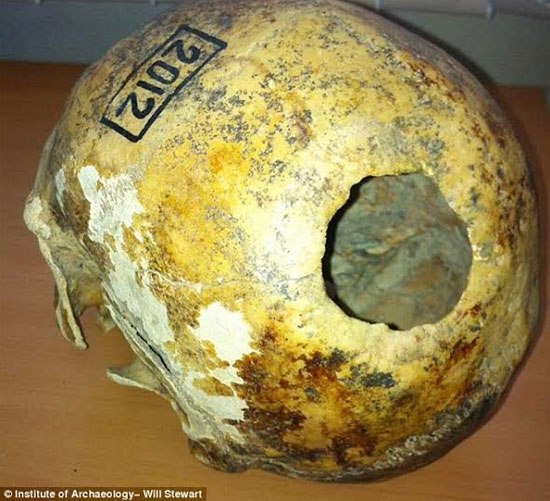Mysterious skull surgery 2300 years ago
Scientists have discovered evidence of brain surgery on two skulls dating back more than 2,300 years.
>>>Details of the technique "skull piercing" for healing
Two skulls are found by archaeologists in the Altai, Siberia mountains. According to the research, these two skulls are believed to be of nomadic member Pazyryk. What is more said, through the study of the two skulls mentioned above, clear traces of surgery were found.
According to the Siberian Times, these two skulls have characteristic traces of skull hole drilling - a risky ancient medical procedure. This is a treatment for many brain diseases, including reduced brain swelling. Historians believe that the ancients used this plan to treat diseases of the nervous system, although modern medicine thought it was a wrong method.
One of the two excavated skulls belonged to a man about 40-45 years old, showing signs of a head injury. Scientists believe that there is a subdural hematoma in this patient's brain. Hematomas can lead to symptoms such as headaches, vomiting and movement problems for the right leg and hand.

The method of drilling skull holes is said to remove hematoma. And evidence of postoperative bone development suggests that this man continued to live for many years after surgery.
The second man was genetically deformed, and the skull hole drilling process improved this situation successfully.
'In the middle of the 19th century, the survival rate of patients undergoing skull hole drilling surgery in the best hospitals of Europe rarely exceeded 10%' , Siberia Institute of Archeology and Ethnology belongs to The Russian Academy of Sciences said in the Siberian Times.
The institute also said that the surgery results on these two skulls were 'very amazing' when taking into account the risks associated with this type of surgery.
Scientists have successfully modeled these two skulls on a computer, along with a third skull of a 30-year-old woman who has not undergone surgery.
Now scientists are planning to reconstruct this surgery on the skull of a dead person, using the same tools and techniques.
By recreating the surgery, scientists at the Institute of Archeology and Ethnology hope to understand more about the tools used, as well as the reasons for conducting surgery.
'Surgery may involve rituals through which humans attain a state of change in consciousness, necessary for religious activities and spells.'
- The surgery for piercing the skull was 3,000 years ago
- New discoveries in Peru reveal the possibility of the Inca skull surgery
- Brain surgery can take place 3,000 years ago
- Technical details of
- 'Artificial' doctors perform brain surgery super fast, only 2.5 minutes instead of 2 hours
- The world's first skull transplant
- Detect strange skull
- For the first time, brain tumors do not open the skull
- Discover two mysterious ancient skulls in China
- The baby was born with a part of the brain outside the skull saved
- Doubts about the mysterious crystal skull case
- Discovered mysterious skull bones 400,000 years old in Portugal
 Discovered an ancient centipede fossil 99 million years old
Discovered an ancient centipede fossil 99 million years old Discovered bat-like dinosaurs in China
Discovered bat-like dinosaurs in China Discovered a 200-year-old bronze cannon of the coast
Discovered a 200-year-old bronze cannon of the coast Discover 305 million-year-old spider fossils
Discover 305 million-year-old spider fossils